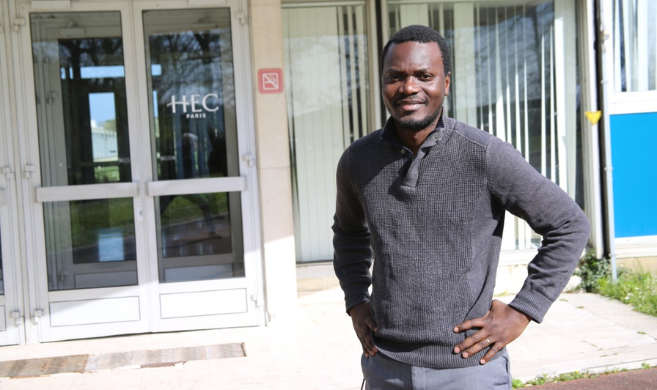Listen to the podcast:
HEC PhD Graduate Revolutionizes Health Practices in D.R.C.
The statistics make for stark reading: with only seven years to go, most African nations face a gargantuan uphill struggle to reach the UN SDG targets. As a result, almost 500 million Africans could be living in extreme poverty by 2030 - at least 70% of whom could still be there in 2050. Which is the main reason behind PhD graduate Anicet Fangwa devoting his academic studies to finding solutions bringing together his competences in engineering and strategy.
Fangwa's work on 1,000 health clinics in the Democratic Republic of Congo could have wide-ranging consequences on health management throughout the continent. In the Knowledge@HEC podcast, Breakthroughs, he explains why. The future Assistant Professor in Strategic Management at McGill University also shares his research on the positive impact women leaders are having in running these same health centers in the DRC.
Doctor Anicet Fangwa, you decided to focus your research and field work on the Democratic Republic of Congo. Why choose this country?
I was born in Cameroon and the DRC for me has always been this huge country full of untapped potential, but which is also characteristic of Africa in general: in the sense that it is full of resources but it is beleaguered by crisis, civil war and instability. The challenge is to help this country reach stability and wealth. For me, studying DRC was a way to study Africa in general, it represents African in miniature, and the idea is to find solutions to its problems, knowing that if it works there, then it should be able to work everywhere else in Africa.
The healthcare in the DRC has a pyramid structure which is guided by the government and several NGOs and NPOs (non-profit organizations). They fund and control public healthcare and its systems. Your focus is on the non-profit organizational side and how management practices can impact the running of health centers and use these bundles of governance mechanisms. In your analysis, you say that management practices in this context are as relevant as economic logic to improve healthcare. What do you mean?
I mean that, as economists, we tend to try to develop policy and financial aid that will increase the amount of resources available. But what I'm trying to say is that there's a behavioral component to the aid. This analyzes how the recipient, the beneficiary of this aid, can better grasp the funds that has been put at her or his disposal and generate much more value out of this fund. Each and every year billions and billions of dollars are invested in developing low income countries, but the improvement and the advance in terms of impact is quite limited. I really wanted to investigate why? Why do we still have such a incomplete impact? And so I look at the behavioral component in terms of management.
That’s to say, we study the routines that health centers put in place, the practices that they implement and how those practices can actually enable them to benefit from the fund they receive.
We found that funding is complementary to good governance.
One of the key takeaways that we have is that funding is complementary to good governance. If you only pour funds into the health centers, what we see is that they improve the volume of the activity, they are able to serve many more people and deliver much more drugs. But the quality of their service is not improved at all. However, when you provide those funds in parallel with good management practices (auditing, feedbacks and the commitment to actually change the behavior of the recipient of the fund), we see an improvement both in quality and quantity. We measure this quality of service by studying the infant mortality rate. In our study of 1,000 rural health centers, we find that we are able to reduce the number of deaths by almost 50% over a four-year period! Keep in mind that the DRC is one of the worst countries to be born in, with an infant mortality rate of 70 for every 1,000 births (Unicef, 2020). Compare that to the USA which has 6 deaths per 1,000 births and France which has 4 deaths per 1,000 births...
An important dimension of proper management is the need to have both staff and the pregnant women follow the process formalized by the WHO to arrive at the end of the pregnancy in good health. Infant mortality is often the result of inappropriate behavior and not following the WHO protocol in its entirety. Proper managerial practices can reduce this, there’s no need for additional medical training or changing employees since, with a proper managerial skill set, we are able to help the latter give the best of themselves and deliver high quality services.
Anicet, in the second of the three papers you presented at your PhD, you focused on women in the boardroom and the impact on the organizations they worked in. It was in the same setting in the DRC where gender inequality is a real issue. Your research suggests that there is a very positive correlation between the higher representation of women in leadership roles and issues such as more investment or greater sympathy for the stakeholders. You write that women bring a lot of positive behavioral evolutions, there's more benevolence, they are less traditional and less obsessed with security. Could you elaborate?
Well, like you mentioned, the DRC is a very patriarchal country. But we were lucky to find some health centers where women led the male employees. We found that women leaders do deliver better, higher quality services in those health centers. But they do it using interesting means that are counter to current literature. The latter suggests that whenever women run an organization or a group, they tend to be more collaborative, engage more in discussion and are able to generate much more interaction between the different groups.
But what I find in the DRC is, this being a highly patriarchal society, women leaders tend to actually reduce the interaction with the group, they call fewer meetings and decide alone on topic like finances. In other words, they rely more on top down management instead of collaborative management in this specific area They also tend to avoid internal conflict since they are aware that the surrounding communities will side with the man instead of the woman. One thing I would love to further explore is the impact of communal conflict on women leaders. My guess is that they will be less concerned about these ethnicity questions and treat all patients with equity. But I do not yet have the data to corroborate my hunch.









